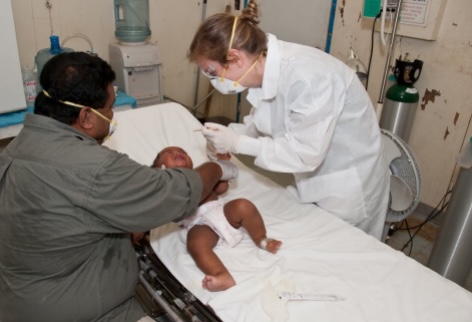The healthcare system has always been a sensitive yet relevant topic in any day and age. Everyone wants accessible healthcare because it’s necessary, especially during emergencies. No matter how careful you are, accidents are bound to happen when we least expect them.
Treatments aren’t cheap and someone always needs to have a health card to make it more affordable. The problem surfaces when there’s no one with a health card or insurance to shoulder the bills. Healthcare then becomes inaccessible and people would prefer hiding their conditions instead.
This problem became prevalent during the pandemic when reporting symptoms mattered most. However, not everyone was willing to report their symptoms to the nearest medical facility. The costs of hospitalization were so burdensome and bleak for them that they’d rather hide it. This became extremely problematic because, by the time they’re admitted, the symptoms have already become much worse. However, primary care has made a big difference in the healthcare system that we know today.
Primary Care Office Defining Primary Care

Source: Pexels
The concept of primary care goes as far back as 1961 but the definition has slightly changed since then. It’s now a model of care that enables first-contact and accessible person-focused care. Health care clinics are your first go-to before you make contact with a specialist. They provide general care necessary for your symptoms depending on the medical field. It helps optimize the population’s health and reduce any disparities by ensuring everyone has access to it.
With primary care, you have first-contact accessibility to healthcare services without a specialist. You can continue treatment and develop long-term relationships with the professionals helping you. There’s a strong continuity with primary care because of its accessibility.
Additionally, it provides comprehensiveness among health professionals. They all know that they’re expected to provide and promote a diverse range of treatments and services. Hence, they all coordinate and organize services to provide a certain level of care based on the health system. Most of all, primary care is people-centered which means it’s focused on caring for and educating people. That way, they can make more informed decisions related to their healthcare.
How Did Primary Care Impact Health Care According to Health Clinics

Source: Pexels
● Health Clinics and Services Become More Accessible
Accessibility has always been an issue with the healthcare system because of the costs. While doctors are bound by oath to take care of those in need, the hospital still needs to earn. The cost of health care then becomes a great obstacle to those who want to provide care and those who seek it.
However, primary care increases the accessibility to health services which is important. For example, populations living in isolated areas usually don’t have access to healthcare services. Hence, they suffer the brunt of pandemics and other outbreaks without standing a chance.
Thankfully, primary care in the form of health care clinics is the main port of entry into healthcare. The care providers can help patients understand and discuss any of their health concerns. If necessary, the professionals can make a referral for more specialized care as well.
● The Quality of Care Has Greatly Improved
The best part about the sciences is that it’s constantly improving thanks to continuous research. That’s why the quality of treatments always evolves, like for general and specialized practices.
Some studies say that specialists tend to adhere to disease-specific guidelines for health issues. This correlates to improved preventive measures, procedures, and prescriptions. However, other studies weren’t able to support this evidence and some areas exhibited different results. For example, for diabetes, a general practitioner’s care is equal to or better than what you get from a specialist.
Depending on the situation, primary care can be more than enough instead of going to the hospital. Your health clinics may have the answer you’re looking for rather than the expensive hospital.
● There’s a Strong Emphasis on Prevention
Usually, people go to hospitals when their symptoms worsen, resulting in more expensive treatment. However, primary care strongly emphasizes preventive interventions. Just as the saying goes “prevention is better than cure”, they impact many aspects of health.
For example, they can advise you on diets, regular exercise, and how to quit smoking. Even topics like breastfeeding are open to discussion even if they’re not specialists. If you’re struggling with any conditions that you can’t talk to anyone regularly, consult the nearest doctor. They’d have an idea of what to prescribe and what you should do or take to prevent the worst.
You can also approach them if you’re suffering from obesity and need a prescription or diet. That way, you can prevent any chronic diseases like diabetes or heart disease. Essentially, primary care will help you have a better lifestyle so you can prevent getting sick.
● Health Conditions Are Managed Earlier
Primary care practitioners have the authority to recommend screening measures. This will help detect any early changes that could lead to specific diseases. This screening includes checking blood pressure, blood tests, and breast examinations. Mammograms, Pap smears, and bowel cancer screening can also be done by the health care clinic.
The problem with approaching hospitals immediately is that you may not have access to primary care providers. If you’re suffering from hypertension or any manageable condition, you’d prefer to approach a primary care provider.
The increase in general practitioners correlates with reduced rates of hospital admissions. That is possible if primary care has been normalized in a location regardless of ethnicity or class.
Conclusion
The healthcare system is rapidly changing over the years, especially since the pandemic. Having access to even the basic level of care is necessary to avoid another outbreak in the future. People need to feel like they can afford professional help without sinking into debt. Healthcare is a necessity for everyone, not just a luxury for those who have the money to spare.
That said, primary care is a huge step toward ensuring all people have access to general care. Regardless of their class, race, or ethnicity, they can afford and have access to healthcare. Their healthcare clinics can help keep their society safe from diseases and treat those with conditions. If necessary, the primary care providers can also refer them to specialists or hospitals for treatment.
FAQs
● If I rarely get sick, do I still need a primary care physician?
Yes, you do because primary care physicians help prevent you from developing anything serious. They offer preventive care like vaccines and lab testing for your blood, cholesterol, and more.
● What should I talk about with my primary care physician?
It’s a common mistake to think that something is too small to tell the physician. However, you shouldn’t hold back with anything regarding your health. For example, side effects, lifestyle choices, and symptoms of depression should be addressed.
● How often should I check in with my primary care physician?
For regular check-ups, scheduling an appointment every year is more than enough. It’s an excellent way to check your health and some insurance companies count it as preventive care.